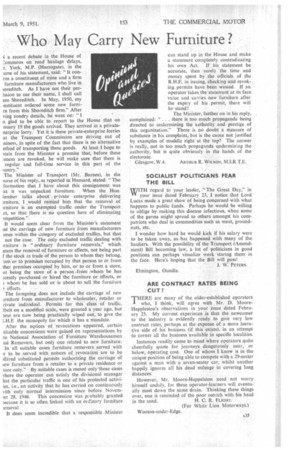Who May Carry New Furniture?
Page 53

If you've noticed an error in this article please click here to report it so we can fix it.
■ 1 a recent debate in the House of 2ommons on road haulage delays, r. York, M.P. (Harrogate), in the urse of his statement, said: "It conmils a constituent of mine and a firm furniture manufacturers who live in ioreditch. As I have not their perission to use their name, I shall call em Shoreditch. In May, 1950, my .nstittient ordered some new furnire from this Shoreditch firm." After ving sundry details, he went on: "1 n glad to be able to report to the House that on nuary 19 the goods arrived. They arrived in a privateIterprise lorry. Yet it is these private-enterprise lorries at the Transport Commission are driving out of isiness, in spite of the fact that there is no alternative ethod of transporting these goods. At least I hope to nain from the Minister a promise that, before these xnces are revoked, he will make sure that there is regular and full-time service in this part of the nintry."
The Minister of Transport (Mr. Barnes), in the mrse of his reply, as reported in Hansard, stated: "The formation that I have about this consignment was at it was unpacked furniture. When the Hon. !ember talks about p. ivate enterprise delivering irniture, I would remind him that the removal of irniture is an exempted traffic under the Transport ct, so that there is no question here of eliminating )mpetition."
It would seem clear from the Minister's statement at the carriage of new furniture from manufacturers )mes within the category of excluded traffics, but that not the case. The only excluded traffic dealing with irniture is "ordinary furniture removals," which leans the removal of furniture or effects, not being part f the stock in trade of the person to whom they belong, nm or to premises occupied by that person to or from ther premises occupied by him, or to or from a store, at being the store of a person .from whom he has )cently purchased or hired the furniture or effects, or ) whom he has sold or is about to sell the furniture r effects.
The foregoing does not include the carriage of new Jrniture from manufacturer to wholesaler, retailer or rivate individual. Permits for this class of traffic, lbeit on a modified scale, were granted a year ago, but -iese are now being practically wiped out, to give the L.H.E the monopoly for which it has a mandate.
After the notices of revocations appeared, certain aluable concessions were gained on representations, by he National Association of Furniture Warehousemen nd Removers, but only one related to new furniture: In all suitable cases furniture removers served with or to be served with notices of revocation are to be• Iffered substituted permits authorizing the carriage Of iew furniture from a retailer to a private residence or tore only." By suitable cases is meant only'those cases vhere the operator can satisfy the divisional manager hat the particular traffic is one of his protected activiies, i.e., an activity that he has carried on continuously vith only normal intermission since before Novernler 28, 1946. This concession was probably granted )ecause it is so often linked with an oidinary furniture einoval.
It does seem incredible that a responsible Minister can stand up in the House and make a statement completely contradicating his own Act. If his statement be accurate, then surely the time and money spent by the officials of the R.H.E. in issuing, checking and revoking permits have been wasted. If an operator takes the statement at its face value and carries new furniture after the expiry of his permit, there will he stand?
The Minister, farther on in his reply, complained: " . . there is too much propaganda being directed to undermining the authority and prestige of this organization." There is no doubt a measure of substance in his complaint, but is the cause not justified by examples of muddle right at the top? The answer is really, not in too much propaganda undermining the authority, but is quite obviously in the hands of the electorate.
Glasgow, W.4, ARTHUR R. WILSON, M.I.R.T.E.




















































































